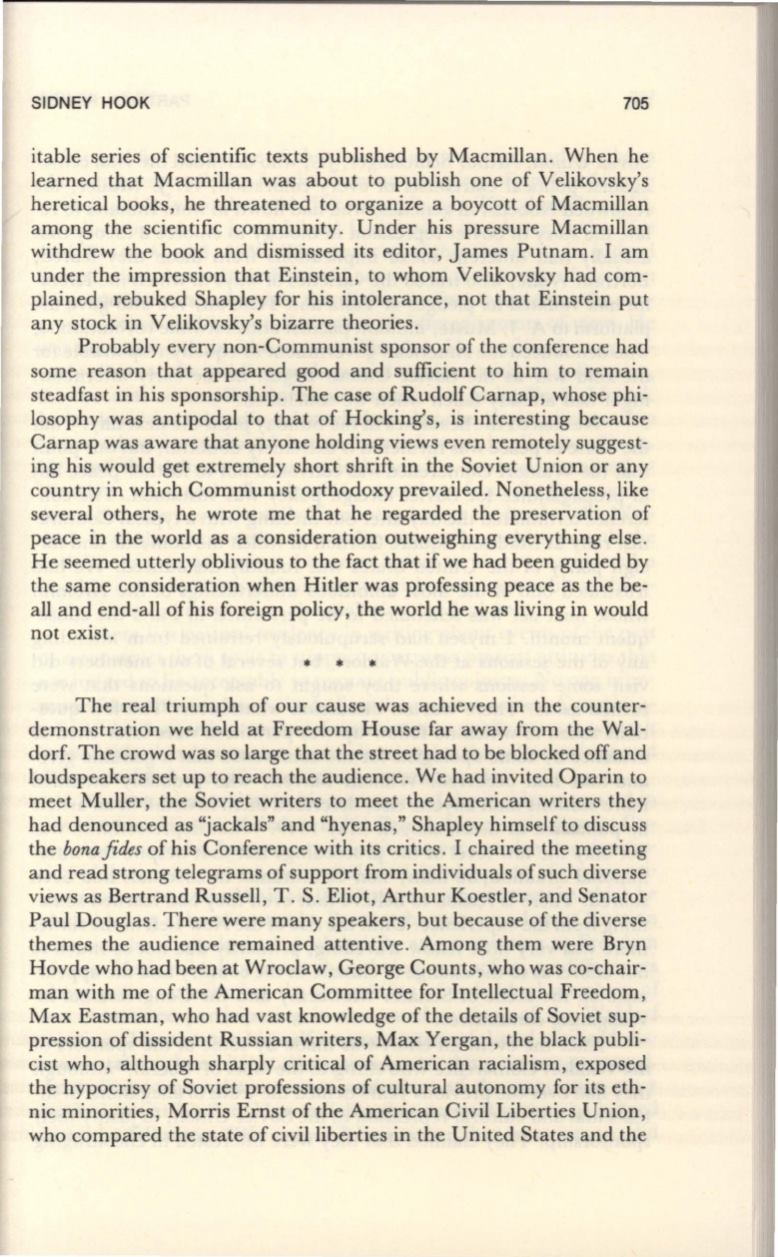
SIDNEY HOOK
705
itable series of scientific texts published by Macmillan. When he
learned that Macmillan was about to publish one of Velikovsky's
heretical books, he threatened to organize a boycott of Macmillan
among the scientific community. Under his pressure Macmillan
withdrew the book and dismissed its editor, James Putnam. I am
under the impression that Einstein, to whom Velikovsky had com–
plained, rebuked Shapley for his intolerance, not that Einstein put
any stock in Velikovsky's bizarre theories.
Probably every non-Communist sponsor of the conference had
some reason that appeared good and sufficient to him to remain
steadfast in his sponsorship. The case of Rudolf Carnap, whose phi–
losophy was antipodal to that of Hocking's, is interesting because
Carnap was aware that anyone holding views even remotely suggest–
ing his would get extremely short shrift in the Soviet Union or any
country in which Communist orthodoxy prevailed. Nonetheless, like
several others, he wrote me that he regarded the preservation of
peace in the world as a consideration outweighing everything else.
He seemed utterly oblivious to the fact that if we had been guided by
the same consideration when Hitler was professing peace as the be–
ali and end-all of his foreign policy, the world he was living in would
not exist.
* * *
The real triumph of our cause was achieved in the counter–
demonstration we held at Freedom House far away from the Wal–
dorf. The crowd was so large that the street had to be blocked off and
loudspeakers set up to reach the audience . We had invited Oparin to
meet Muller, the Soviet writers to meet the American writers they
had denounced as 'jackals" and "hyenas," Shapley himself to discuss
the
bona fides
of his Conference with its critics . I chaired the meeting
and read strong telegrams of support from individuals of such diverse
views as Bertrand Russell, T. S. Eliot, Arthur Koestler, and Senator
Paul Douglas . There were many speakers, but because of the diverse
themes the audience remained attentive. Among them were Bryn
Hovde who had been at Wroclaw, George Counts, who was co-chair–
man with me of the American Committee for Intellectual Freedom,
Max Eastman, who had vast knowledge of the details of Soviet sup–
pression of dissident Russian writers, Max Yergan, the black publi–
cist who, although sharply critical of American racialism, exposed
the hypocrisy of Soviet professions of cultural autonomy for its eth–
nic minorities , Morris Ernst of the American Civil Liberties Union,
who compared the state of civil liberties in the United States and the


